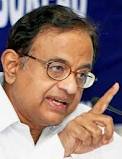
New Delhi, July 11: Home minister P Chidambaram, who may take charge of the finance ministry before Parliament's monsoon session begins early next month, on Tuesday indicated that the government has lined up measures to boost revenue collection and control unnecessary expenditure.
"I think the prime minister-cum-finance minister is contemplating a number of measures to tighten revenue collection and to control wasteful expenditure. We have already imposed across-the-board cut on non-plan expenditure. That will help," an agency report quoted Chidambaram as saying in Bangalore.
The statement came amid strong indications that Prime Minister Manmohan Singh may ask Chidambaram to take over as finance minister ahead of the monsoon session likely to begin around August 7. Sources described his return to the finance ministry as a strong likelihood, although finding his replacement in the home ministry is proving to be a challenge.
The PM has been holding charge of the ministry since Pranab Mukherjee resigned on June 26 to contest the presidential polls. However, sources close to the PM feel that the arrangement cannot be continued for long.
Having twice served as finance minister, Chidambaram is seen as a safe pair of hands at a time when the economy has hit a rough patch. His appointment as Mukherjee's successor before the monsoon session will also spare the prime minister the tough job of answering Parliament when the economy has become a hot button issue.
The consideration is the reason why the lack of an obvious alternative in the home ministry may not come in the way of his shift to the other end of North Block. Sources said power minister Sushilkumar Shinde, who is tipped to replace Mukherjee as leader of Lok Sabha, is emerging as a strong probable for the home ministry. Although he lacks the vigour that Chidambaram showed when he took charge of the ministry post-26/11, the dalit politician from Maharashtra is seen as having an edge because of the rich experience he accumulated during various stints, including chief ministership.
Chidambaram, who has endured a relentless opposition offensive to re-emerge as a key player, is already fully engaged with economic issues. He has been appointed the head of the empowered group of ministers on spectrum, an appointment which was meant to signal the PM's confidence in him in the face of opposition's charge of collusion with former telecom minister A Raja.
The revamped ministerial panel is meeting on Friday to set the stage for auction of spectrum which will also help improve the government's finances.
On Tuesday, Chidambaram, while identifying the global economic situation as the main culprit for the domestic slowdown, acknowledged that some of the factors responsible were local. "UPA-2 has gone through some difficulties. Some of the difficulties may be of our own making. Most of the difficulties (on the economic front) are because of the international situation," an agency report quoted him saying.
He also referred to his last tenure in the finance ministry, stressing, according to the agency report, that during UPA-1, the economy clocked an average 8.5% growth.
He said 2011-12 was a bad year during which the country achieved a GDP growth of 6.5% which is "not enough" for a developing country like India where millions of people are in poverty. "We need to grow at a faster rate. We need to create more jobs," he said, adding India needs to grow at over 8% or perhaps at 9%.
Despite the difficulties, Chidambaram said the UPA government has identified the problems and the PM was addressing these issues. "We know the problems. We are addressing the problems," he said, according to the agency report.





Comments
Add new comment